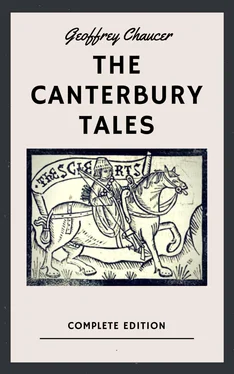22. The "caduceus."
23. Argus was employed by Juno to watch Io with his hundred eyes but he was sent to sleep by the flute of Mercury, who then cut off his head.
24. Next: nearest; German, "naechste".
25. Clary: hippocras, wine made with spices.
26. Warray: make war; French "guerroyer", to molest; hence, perhaps, "to worry."
27. All day meeten men at unset steven: every day men meet at unexpected time. "To set a steven," is to fix a time, make an appointment.
28. Roundelay: song coming round again to the words with which it opened.
29. Now in the crop and now down in the breres: Now in the tree-top, now down in the briars. "Crop and root," top and bottom, is used to express the perfection or totality of anything.
30. Beknow: avow, acknowledge: German, "bekennen."
31. Shapen was my death erst than my shert: My death was decreed before my shirt ws shaped — that is, before any clothes were made for me, before my birth.
32. Regne: Queen; French, "Reine;" Venus is meant. The common reading, however, is "regne," reign or power.
33. Launde: plain. Compare modern English, "lawn," and French, "Landes" — flat, bare marshy tracts in the south of France.
34. Mister: manner, kind; German "muster," sample, model.
35. In listes: in the lists, prepared for such single combats between champion and accuser, &c.
36. Thilke: that, contracted from "the ilke," the same.
37. Mars the Red: referring to the ruddy colour of the planet, to which was doubtless due the transference to it of the name of the God of War. In his "Republic," enumerating the seven planets, Cicero speaks of the propitious and beneficent light of Jupiter: "Tum (fulgor) rutilis horribilisque terris, quem Martium dicitis" — "Then the red glow, horrible to the nations, which you say to be that of Mars." Boccaccio opens the "Theseida" by an invocation to "rubicondo Marte."
38. Last: lace, leash, noose, snare: from Latin, "laceus."
39. "Round was the shape, in manner of compass, Full of degrees, the height of sixty pas" The building was a circle of steps or benches, as in the ancient amphitheatre. Either the building was sixty paces high; or, more probably, there were sixty of the steps or benches.
40. Yellow goldes: The sunflower, turnsol, or girasol, which turns with and seems to watch the sun, as a jealous lover his mistress.
41. Citheron: The Isle of Venus, Cythera, in the Aegean Sea; now called Cerigo: not, as Chaucer's form of the word might imply, Mount Cithaeron, in the south-west of Boetia, which was appropriated to other deities than Venus — to Jupiter, to Bacchus, and the Muses.
42. It need not be said that Chaucer pays slight heed to chronology in this passage, where the deeds of Turnus, the glory of King Solomon, and the fate of Croesus are made memories of the far past in the time of fabulous Theseus, the Minotaur-slayer.
43. Champartie: divided power or possession; an old law-term, signifying the maintenance of a person in a law suit on the condition of receiving part of the property in dispute, if recovered.
44. Citole: a kind of dulcimer.
45. The picke-purse: The plunderers that followed armies, and gave to war a horror all their own.
46. Shepen: stable; Anglo-Saxon, "scypen;" the word "sheppon" still survives in provincial parlance.
47. This line, perhaps, refers to the deed of Jael.
48. The shippes hoppesteres: The meaning is dubious. We may understand "the dancing ships," "the ships that hop" on the waves; "steres" being taken as the feminine adjectival termination: or we may, perhaps, read, with one of the manuscripts, "the ships upon the steres" — that is, even as they are being steered, or on the open sea — a more picturesque notion.
49. Freting: devouring; the Germans use "Fressen" to mean eating by animals, "essen" by men.
50. Julius: i.e. Julius Caesar
51. Puella and Rubeus were two figures in geomancy, representing two constellations-the one signifying Mars retrograde, the other Mars direct.
52. Calistope: or Callisto, daughter of Lycaon, seduced by Jupiter, turned into a bear by Diana, and placed afterwards, with her son, as the Great Bear among the stars.
53. Dane: Daphne, daughter of the river-god Peneus, in Thessaly; she was beloved by Apollo, but to avoid his pursuit, she was, at her own prayer, changed into a laurel-tree.
54. As the goddess of Light, or the goddess who brings to light, Diana — as well as Juno — was invoked by women in childbirth: so Horace, Odes iii. 22, says:—
"Montium custos nemorumque, Virgo,
Quae laborantes utero puellas
Ter vocata audis adimisque leto,
Diva triformis."
("Virgin custodian of hills and groves, three-formed goddess who hears and saves from death young women who call upon her thrice when in childbirth")
55. Every deal: in every part; "deal" corresponds to the German "Theil" a portion.
56. Sikerly: surely; German, "sicher;" Scotch, "sikkar," certain. When Robert Bruce had escaped from England to assume the Scottish crown, he stabbed Comyn before the altar at Dumfries; and, emerging from the church, was asked by his friend Kirkpatrick if he had slain the traitor. "I doubt it," said Bruce. "Doubt," cried Kirkpatrick. "I'll mak sikkar;" and he rushed into the church, and despatched Comyn with repeated thrusts of his dagger.
57. Kemped: combed; the word survives in "unkempt."
58. Alauns: greyhounds, mastiffs; from the Spanish word "Alano," signifying a mastiff.
59. Y-ment: mixed; German, "mengen," to mix.
60. Prime: The time of early prayers, between six and nine in the morning.
61. On the dais: see note 32 to the Prologue.
62. In her hour: in the hour of the day (two hours before daybreak) which after the astrological system that divided the twenty-four among the seven ruling planets, was under the influence of Venus.
63. Adon: Adonis, a beautiful youth beloved of Venus, whose death by the tusk of a boar she deeply mourned.
64. The third hour unequal: In the third planetary hour; Palamon had gone forth in the hour of Venus, two hours before daybreak; the hour of Mercury intervened; the third hour was that of Luna, or Diana. "Unequal" refers to the astrological division of day and night, whatever their duration, into twelve parts, which of necessity varied in length with the season.
65. Smoking: draping; hence the word "smock;" "smokless," in Chaucer, means naked.
66. Cerrial: of the species of oak which Pliny, in his "Natural History," calls "cerrus."
67. Stace of Thebes: Statius, the Roman who embodied in the twelve books of his "Thebaid" the ancient legends connected with the war of the seven against Thebes.
68. Diana was Luna in heaven, Diana on earth, and Hecate in hell; hence the direction of the eyes of her statue to "Pluto's dark region." Her statue was set up where three ways met, so that with a different face she looked down each of the three; from which she was called Trivia. See the quotation from Horace, note 54.
69. Las: net; the invisible toils in which Hephaestus caught Ares and the faithless Aphrodite, and exposed them to the "inextinguishable laughter" of Olympus.
70. Saturnus the cold: Here, as in "Mars the Red" we have the person of the deity endowed with the supposed quality of the planet called after his name.
71. The astrologers ascribed great power to Saturn, and predicted "much debate" under his ascendancy; hence it was "against his kind" to compose the heavenly strife.
72. Ayel: grandfather; French "Aieul".
73. Testers: Helmets; from the French "teste", "tete", head.
74. Parements: ornamental garb, French "parer" to deck.
75. Gniding: Rubbing, polishing; Anglo-Saxon "gnidan", to rub.
76. Nakeres: Drums, used in the cavalry; Boccaccio's word is "nachere".
Читать дальше












